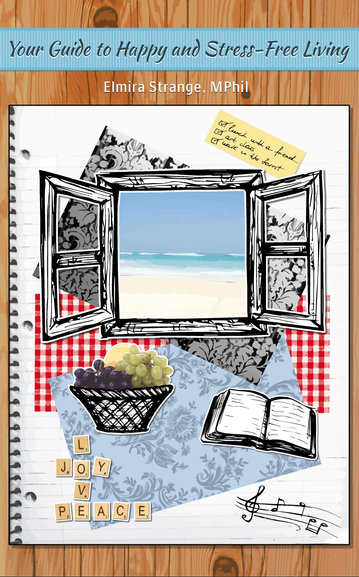How stress
affects your health: What stress is doing to your body
For the last seven years I have been learning about the topic of stress.
You have probably also heard that if you are under constant high levels of
stress it is detrimental for your health, as it weakens your immune system and because
of this you can become seriously ill.
I knew this too, but I only truly
realised how seriously damaging stress could be when I became seriously ill.

by Elia Strange
I've have been
working in a high-flying career as a senior researcher and part-time Psychology
lecturer, whilst completing my PhD at the same time. As part of my job I would
be attending conferences where I would be presenting my findings and also preparing
for workshops and lectures. This was incredibly exciting but would often take
me to the point where I would be shaking with anxiety. But as time passed and
the workload increased and I was experiencing these symptoms on a nearly daily
basis.
I enjoyed the buzz of rising to these challenges, nearly every day I had
felt 'driven' by the demands of my exciting career, but the pleasure faded and more
and more often I would simply feel stressed and then I felt 'exhausted'.
This cycle
of elation followed by anxiety lasted for many months, even years.
Then I became
ill, seriously ill.
I had developed a condition called Ulcerative Colitis and
it flared up really aggressively.
For those of you who don't know what
Ulcerative Colitis is, I'll just say that it is a disease that belongs to a
group of Inflammatory Bowel Diseases (IBD). When you are ill with form of IBD
your life becomes a nightmare as you cannot digest your 'normal' meals anymore
(I have always been known as an extremely 'healthy eater' and a ‘gym bunny’
amongst my friends!), and you literally become 'chained' to the loo as what you
have eaten doesn't stay in your body and feels like razor wire is being pulled
through you.
My energy levels
became extremely low and my body weight dropped so much that I looked really
old and pale, so much so that I looked like a zombie. And every time that I
tried to eat or drink it would instantly cause me extreme agony and pass
through my body in minutes (this is not for the squeamish), causing me to lose a
lot of blood from my bottom (sorry for such details).
Basically,
it's not fun.
In December 2012 I was rushed into accident & emergency.
The doctors
immediately admitted me and I was put on a drip and a heavy-duty course of
anti-inflammatory drugs and steroids. After four days on this drug therapy my
condition was showing no sign of improving and I ended up having life-saving,
complex surgery on my bowels.
It took me until this point where my own health had reached crisis to make me seriously look into my own life style.
Here I sadly realised that as human beings we are not that robust. We might think we can do everything we want: looking after our family, doing interesting (though demanding) careers, pursue our hobbies. And our life might seem to be really exciting although to the point of being 'boiling hot' at times.
But here is the truth - Our energy
and health reserves are limited.
Limited in a sense that when you get up in the morning you
only have so much in your ‘energy bank’. If you deplete it by lunchtime by
doing many tasks, getting really excited or angry about something, then by the
evening you will feel absolutely exhausted.
If this repeats daily, then your
reserves may become so low, that you become ill with a bug, or even some more
serious disease. I was mentioning this in my other article, where I was
saying that your health depends on the stage of stress you might be in.
You might have heard about people who gave up their flying-careers and settled
for something that is paid less but more is satisfying, relaxing, and less
stressful. Usually these people had a serious knock on their health. May be
they suffered a heart attack, stroke or a total breakdown at some point
of their life.
When you
get stressed and then ill, this means that your body simply cannot take it
anymore. After giving you many of its signals and pre-warning moments (like
little ‘colds’, ‘flu’, ‘allergies’, etc), where you should've stopped and made
serious adjustments to your life (e.g. sleep more, play more, relax more, change
the job, etc), eventually it goes into a crisis moment and stops you
completely.
Well, if you are lucky, it will just stop you for several weeks or a couple of months, but it can also stop you for years or for ever. As some doctors say ‘the first sign of a heart trouble may be your last’ as in when you get a heart attack.
So, where is the proof that stress is
that bad to your health?
1) In the
year of 2004, 293 (!) scientific
studies were combined into 1 meta-analysis so to reveal what stress can do to
our immune system.
They found that long-term stress affect a large number of
conditions: anxiety and depression, sleeping problems, hypertenstion, heart
disease, stroke, cancer, ulcers, colds and flu, rheumatoid arthritis, obesity
and even the rate of ageing.
Stress depresses our immune system so it cannot
deal with any health problems properly. And this all means that if we don't
reduce stress in our lives, we become ill and are unable to enjoy our lives.
However, the studies also show, that if
we do everything we can to reduce stress, then we recover faster from any
illness and disease.
2) In 2001, the study on stress and HIV patient’s recovery revealed that antiretroviral
drugs that are prescribed to HIV patients do
not work well for those who are generally stressed.
The scientists measured
the patients' blood pressure, skin moisture and heart rates at rest before the
antiretroviral drugs were given. And over the next 3 to 11 months, their viral
load and CD4 cell count were measured.
The results were dramatic.
The higher the patient's stress level, the
less they responded to the antiretroviral drugs. The average reduction in
viral load was more than 40 times for men with low stress, but less than ten
times for men with high stress.
So basically, the drugs worked four times better for the patients who were calm
than for those who was most stressed.
So what can you do to lower your stress levels?
1) Let it out - whether it is on the paper or to someone else.
In 1995, one
scientific study showed how important it is to vent out what is bothering you.
In the study, medical students asked to write about their past traumatic
experiences for 4 days, whereas other medical students were asked to write only
about their daily (non-traumatic) experiences.
After several days of writing,
they were given a vaccination for hepatitis B.
When blood samples were taken
after four and six months, the group who
had written about their traumatic experiences had much higher antibody levels
against hepatitis B than the group who just wrote about their daily
experiences.
2) Relax.
Studies show that those who meditate or use any relaxation techniques
on a regular (daily) basis, have significant improvement in mood, reduced
anxiety and stress levels, and even experience better health based on their
genetic blood analysis.
The relaxation
techniques that are proven to be effective, are for example: meditation and
Mindfulness, yoga, repetitive prayer, tai chi, qi gong, breathing
exercises and guided imagery. There is no limit on how much you can do, but the
studies show that the more you do it, the better.
And doing them on regular
basis is more effective than doing then occasionally.
3) Also, read my other articles for more tips on how to reduce your stress. For
example, Learn how to reduce your stress instantly in 3 easy steps.
4) Learn what to do when you are stressed out on a daily basis.
5) Know your signs and symptoms of stress.
6) Learn to manage your stress at work.
I hope you enjoyed this article and maybe now you realise that stress is a more
serious thing than we ever thought.
I hope you will look into your own life and
make the needed adjustments. Please take care of your own health and do it in
time.
You are
welcome to add your own tips on reducing stress to the Facebook comments box
below for others to see.
Or follow me on Twitter and Google+ by clicking on the symbols below:
Sign
up below to receive my free email newsletter with new fresh articles to
help you to become healthier and happier.
It's sent about once a month.
No spam. No
sharing of your email address. Easily unsubscribe at any time.
Best Articles:
10 tips to strengthen your marriage
Best ways to manage your stress
How to get what you want (the Law of Attraction)
Why do I need to eat healthy?
Signs and stages of stress
13 Facts about sugar addiction
7 Reasons for our unhappiness
Why people commit suicide
How to get a good night sleep
Try these Tests and Quizzes:
Is it time to take stress seriously?
How well do you know yourself?
Can you talk to teenagers?
Do you have a time to recreate?
Can you cope with stress well?
The Latest Articles:
Green Smoothie Recipe
Stress in Parents and Carers of disabled children (VIDEO)
Did you find your dream job yet?
Is an eye mask good for sleeping?
How to look and appear confident
Why am I tired all the time?
Exercise tips: 8 easy ideas for losing weight and become fitter
15 Sure signs that you are stressed
Are memory foam mattresses worth it?
How stress affects your health: What stress is doing to your body
How to get what you want (the Law of Attraction)
How to be more patient
How to deal with SAD: Autumn depression
How to stop negative thinking
How bad is your memory? (Fun Quiz)
What is love - in children words
How to make people like you?
Why do I forget things?
10 Tips to strengthen your marriage
Would you move abroad?
Are holidays worth it?




New! Comments
Have your say about what you just read! Leave me a comment in the box below.